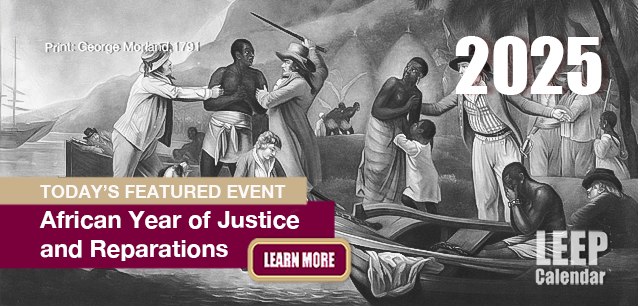 AD
AD
Country
- Africa
- Alcohol, Tobacco & Drugs
- Animals, Fish, Insects & Birds
- Anniversaries
- Australia
- Books
- Brazil & S.America
- Buddhism
Category
- Afghanistan, AF
- Aland Island, AX
- Albania, AL
- Algeria, DZ
- American, Samoa, AS
- Andarra, AD
- Angola, AO
- Anguilla, Al
Event Type
- Daily
- Weekly
- Annual
- Recurring
Duration
- All
- 1 Day
- 2 Day
- 3 Day
- 4 Day
- 5 Day
- 6 Day
Event Type
- Daily
- weekly
- Annual
- Recurring
Event Type
- Daily
- weekly
- Annual
- Recurring
Today is: April 24
Animals, Laboratory Animals, World Day for
Armenian Genocide Day of Remembrance (1915-1923) Intl
Easter Rebellion (IE)(1916)
Gathering of Nations (US-NM)
Girls in ICT Day, Intl.
Harrogate Spring Flower Show (UK)
Meningitis Day, World
Multilateralism and Diplomacy, Intl Day
Newspaper Day, American (1704)
Pig in a Blanket Day
Sumardagurnn Fyrsti (IS)
Take Our Daughters and Sons to Work Day
After School Professionals Appreciation Week
Beef Week, Great British (UK)
Coconut Week, Ntl.(KE)
Coin Week, Ntl.
Dark Sky Week, Intl.
Egg Salad Week
Every Kid Healthy Week
Fiesta San Antonio (US-TX)
Immunization Week, World
Infant Immunization Week, Ntl.
Infertility Awareness Week, Ntl.
Karaoke Week, Ntl.
Laboratory Animals, World Week For
Lesbian Visibility Week, Intl.
Mammal Week, Ntl. (UK)
Parks Week, Ntl
Pediatric Transplant Week, Ntl.
Playground Safety Week, Ntl.
Ridván (1863)
School Volunteer Week, Ntl.
Sky Awareness Week
Snooker World Championship (UK)
Student Leadership Week, Ntl.
Undergraduate Research Week
Volunteer Week, Ntl.(US/CA)
Work Zone Awareness Week, Ntl.
Youth Violence Prevention Week
9-1-1 Education Month, Ntl.
Administrative Professionals Month
Adopt a Ferret Month
Adopt a Greyhound Month, Ntl.
African-American Women's Fitness Month, Ntl
Alcohol Awareness Month
Animal, Prevention of Cruelty to Animals Month
Arab-American Heritage Month
Architecture Month, Washington (US-DC)
Astronomy Month, Global
Autism Acceptance Month, Ntl.
Barefoot, One Day Without Shoes
Barefoot, One Day Without Shoes
Beaver Awareness Month
Bereaved Spouses Awareness Month, Intl
Black Women's History Month, Intl
Cancer Control Month
Canine Fitness Month
Car Care Month, Ntl. Spring
Cesarean Awareness Month, World
Child Abuse Prevention Month, Ntl.
Community College Month
Community Spirit Days
Confederate Heritage Month
Counseling Awareness Month
Couple Appreciation Month
Credit Union Youth Month™, Ntl.
Customer Loyalty Month, Intl.
Decorating Month, Ntl.
Diabetes Month, Ntl. Defeat
Distracted Driving Awareness Month, Ntl.
Donate Life Month, Ntl.
Earth Month
Earth Month
Emotional Overeating Awareness Month
Fabry Awareness Month (AU/CA/US)
Facial Protection Month, Ntl.
Fair Housing Month
Financial Capability Month, Ntl.
Financial Literacy Month
Foot Health Awareness Month, Ntl.
Frog Month, Ntl.
Grange Month
Grilled Cheese Month, Ntl.
Guitar Month, Intl.
Heartworm Awareness Month, Ntl.
Holy Humor Month (C)
Humor Month, Intl.
Irritable Bowel Syndrome Awareness Month
Jazz Appreciation Month
Keep America Beautiful Month
Kite Month, Ntl.
Knuckles Down Month, Ntl
Landscape Architecture Month, World
Lawn Care Month, Ntl.
Lawn Greetings Month
Lawn and Garden Month
Letter and Card Writing Month, Ntl.
Library, School Library Month, Ntl
Licorice Month, Ntl.
Limb Loss Awareness Month, Ntl.
Lyme Disease in Dogs Prevention Month
Mathematics and Statistics Awareness Month
Medical Cannabis (Marijuana) Education and Awareness Month
Minority Cancer Awareness Month
Minority Health Month, Ntl.
Native Plant Month, Ntl.
Nisan (J)
Occupational Therapy Month, Ntl.
Oral Health Month, Ntl. (US/CA)
Oral, Head and Neck Cancer Awareness Month, Ntl.
Parkinson's Awareness Month
Pecan Month, Ntl.
Pest Management Month, Ntl.
Pet First Aid Awareness Month, Ntl.
Pet Month, Ntl. (UK)
Pharmacists' War on Diabetes
Pickleball Month
Poetry Month
Procrastination Awareness Month
Rebuilding Month, Ntl.
Records and Information Management Month
Rosacea Month, Ntl.
STD Awareness Month, Ntl.
Safe Digging Month, Ntl.
Sarcoidosis Awareness Month
School Library Month, Ntl.
Second Chance Month, Ntl.
Sexual Assault Awareness Month
Shawwal (M)
Sikh Awareness Month
Skagit Valley Tulip Festival (US-WA)
Skagit Valley Tulip Festival (US-WA)
Soft Pretzel Month, Ntl.
Soyfoods Month, Ntl.
Sports Eye Safety Month
Sprouted Grains Month
Straw Hat Month
Stress Awareness Month, Ntl.
Supply Chain Integrity Month
TWIT Award Month, Intl.
Testicular Cancer Awareness Month
Vaisakh (S)
Vaisakh (S)
Vaisakha (H)
Welding Month, Ntl.
Woman, Informed Woman Month
Women's Eye Health and Safety Month
Workplace Conflict Awareness Month
World Expo 2025 (JP)
Youth Services Month, Global
Youth Sports Safety Month
LEEP Calendar
Scroll to explore events active on this date.
Additional Events on LEEP
LEEP INK FEATURES

Events in April 2025
Spring has sprung in the north, and the first hints of Autumn are on the horizon in the south. April is the month spring (or fall) gets underway, and it is filled with religious celebrations, including the Mu...

Metamorphic March: Trends and events in March 2025
Welcome to Spring or Autumn. This is a transitional month with something for everyone. Internationally, it is Women's History Month, focusing on the achievements, needs, and challenges that women ...

February Favorites
The world steps into the second month of 2025 with hope and trepidation. The United States has a new administration. Canada is finding its way to a new administration. Germany and several other European nations...
About Fastnacht Day
Food , European Countries
United States
Ends: Feb 21, 2023
DESCRIPTION:
Fasnacht Day has a rich and varied history, and its celebration continues to evolve and adapt to new cultural and social contexts worldwide.
Fasnacht Day, also known as Fat Tuesday or Mardi Gras, is a traditional holiday celebrated in various parts of the world, particularly in Europe and the Americas. The holiday is typically observed on the day before Ash Wednesday, heading into the Christian season of Lent.
The history of Fasnacht Day dates back several centuries, tracing to medieval Europe. In many cultures, the day before the start of Lent was a time of feasting and merriment as people prepared to observe the solemn period of fasting and reflection in the weeks ahead.
One of the earliest known references to Fasnacht Day comes from the city of Basel in Switzerland, where a carnival tradition known as Fasnacht began in the 14th century. The festival features elaborate parades, street performers, and other festivities—a final burst of enjoyment before the austere period of Lent begins.
Similar celebrations occur throughout Europe, including Germany, Austria, and France, under Karneval, Fasching, and Carnaval and are often associated with masks and costumes as people participate in parades and street parties.
In the United States, Fasnacht Day is heralded by the Pennsylvania Dutch, particularly in Lancaster and York. Central to Pennsylvania celebrations is a doughnut called a "fasnacht," made with potato dough and fried in lard. The eating of fasnachts the day before Lent arrived in the region by German settlers in the 18th and 19th centuries.
VIDEOS
Currently, this event does not have supporting videos.
SUPPORTING DOCUMENTS
Currently, this event does not have supporting documents.
ADDITIONAL IMAGES
Currently, this event does not have supporting images.
Where would you like to go now?
 AD
AD
By using this site. You are agreeing to use of cookies. Learn more in our Privacy Policy
/footer-logo.svg)
LEGAL: Excerpts and links may be used, provided that full and clear attribution is given to Jubilee LLC and LEEPCalendar.com, with appropriate and specific direction to the original content (Page URL). Additional documents, embedded videos and additional image rights retained by their creators and are provided to increase understanding of the event or topic.
Jubilee LLC reserves the right to accept or reject inclusion of events in this calendar. The appearance of an event in LEEP Calendar does not imply endorsement of the event, nor the organization championing the event by Jubilee LLC, its stakeholders, customers or subsidiaries. All dates, contact information, URLs, addresses, and information relating to any event, promotion or holiday are subject to change without notice and should be treated as estimated. Jubilee LLC, our stakeholders, customers and subsidiaries cannot warrant accuracy. Users of this application are solely responsible for verifying actual event date with organizers and additional sources prior to committing resources, financial, human or otherwise.































































